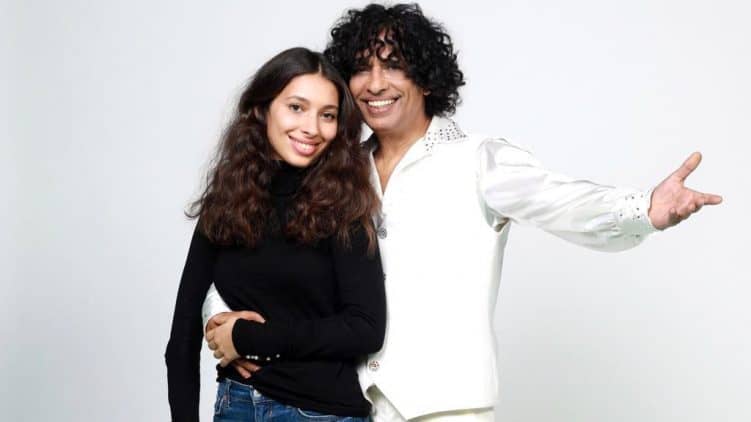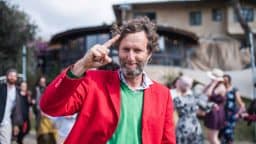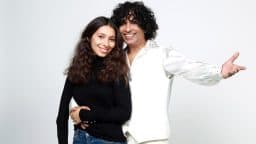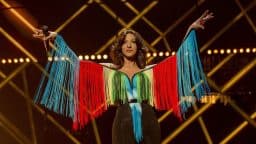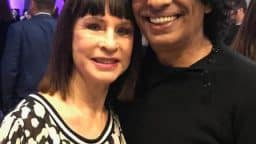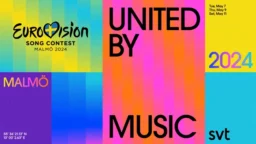Izhar Cohen (1951) was the first Israeli winner ever. He competed for his country in Paris in 1978 and won with the now iconic disco song A-ba-ni-bi. Still being a renowned and respected performer, he talks to Eurostory about the glory of it all – and the hardships.
You are the very first Israeli winner, and now the festival has returned to your country. How is this Eurovision season for you?
Well, very busy. I’m sixty-eight years old, but still moving like sixteen. During every Eurovision season they make me crazy, but this year it’s even more… I don’t know. It’s very strange, actually. People keep remembering my songs. I don’t really understand how that happened, but it just did. I appreciate it, it makes me very happy. You know, when my daughter Elia [see main photo*] went to Paris for the first time, I told her about all the places I had been to at the time. Where I performed, where I lived. And when she was there, she and her mother got things for free in shops, I was shocked. I said: tell them that your father was performing here in the seventies, and what happened? They treated her like a queen. It was so touching.
You also have your own shop.
Yes, I have a jewelry shop. I made a necklace that I want to sell as a memory of people’s visit in Israel, and it’s not a simple one. It’s silver, and gold, something of real good quality. I’ll try to make it for a price that everyone can afford, even though the material is very expensive. It will be available in the weeks of Eurovision.
Can you tell me a bit about your career change?
Actually, I didn’t change my career. I added it to my career, because I’m still performing a lot. I didn’t stop for a day. There were always several things I dreamt of doing, but for a long time I didn’t dare to pursue them. I had the idea that since I was on stage, I couldn’t do anything else. So it took me a while to be able to start working on this passion. But then, when my daughter, who is twenty years old now, was born, I realized I had to devote my life to the things that were really important to me. That was the turning point. In the beginning it felt like I had abandoned the stage. But after a while I understood I can do everything at the same time. But it takes a lot of effort and hard work. I do the design and I manufacture the pieces.
Ah, you do the handwork as well?
Of course! Everything in the shop is made by my own ten fingers. I really love it, I love, love it! My next dream is to open a restaurant, because I’m a very good cook. But I think I have to give up that dream, because it’s too hard.
So let me sum it up, you are a cook, a designer, a singer and a song writer. You have four professions.
When I was a child, my family pushed me to do all kinds of arts. I was a talented music child and I wanted to be a conductor. Classical music, that was my number one goal. Then I went into the army. In Israel we have army music groups, and within two months I had my first hit. I was nineteen.
This was in the early seventies. You were already very well known before entering Eurovision.
In those times the image of Israel was that of a young country, with beautiful people. But our music culture was local. We were not a part of any international scene. We were dreaming to be ‘on the map’. And then, later in the seventies, there were three important years. In 1976 a Israeli beauty queen won Miss Universe, in 1977 the basketball team of Maccabi Tel Aviv won the European Championships, and in 1978 I won Eurovision. You know, in Israel I’m the symbol of a historical moment. My winning in the Eurovision wasn’t just a song that won, it was a turning point.
But you said classical music was your first choice. And then you entered Eurovision with a disco song.
I’m like a salade niçoise. I have many different backgrounds. My grandparents came to Israel from Yemen. The Yemenite culture has a very high standard. My parents, who were born in Israel, were big artists. In the time Israel was built, they were part of the new wave of Israeli folk music. And I myself was a hippy. A flower child of the sixties. So the mix of all these things influenced me. In one way I’m a very authentic Israeli singer and in another way I was like the disco prince of Israel.
Do you remember the very first time you heard A-ba-ni-bi?
I was at a ballet performance in Jerusalem, and I got a request: can you call Ehud Manor, the songwriter? Right now, please? So I did, and he said he had something very important to tell me. The next morning I met him, and he took me to the house of Nurit Hirsch, the composer. There they said: ‘We have a song for Eurovision and we see you as the singer.’ I heard the melody, and I immediately saw how I could perform this on stage. I had been studying in Hollywood for two years, and returned with new ideas. That’s where the style of the song came from.
Did you like the song from the beginning?
Absolutely! So we recorded it and they sent it the selection committee for the Israeli preselection. There were hundreds and hundreds of songs, but we were one of the songs that could enter. I remember I was performing in New York when they called me to tell me we were in. At that time the preselection was such a strong fight. The best and most professional artists were competing. But I won it. And all the rest is history.
And you were off to Paris.
At that time Eurovision wasn’t a big, big party, like now, but it was an important competition in Europe. And the competition was not between songs, it was between countries. You would represent a flag. To represent Israel at Eurovision in that time was like being on God’s wings. Like being the prince of the country. Nobody believed that Israel would ever win, because we had to sing in our own language. So when it happened it was like an earthquake. In Israel, but in Europe too, because it was the first time a small, not exactly European country, won. And then I brought colour to Israeli television! Because the next year the festival took place in Jerusalem, and it had to be broadcast in colour. Before that, we still had black and white. Many, many things happened.
People were dancing in the streets for days…
Winning in that time was so strong. A-ba-ni-bi has become a classical song, also in Europe. It’s a song that makes you happy from the first note. That’s rare, you know. Everything was right, the arrangement, the singing, the clothes, the dance. I see that now, when I look back on it. Kids in kindergarten, children at school and army soldiers everywhere, they all know the song. You know how many generations have been born since then? It’s forty one years ago!
How does that affect you? You have sung so many other songs, but you’ll always be remembered for this one.
Once someone came to me in the street, and he said: ‘You know Izhar, you are a very lucky man.’ I said: ‘What do you mean?’ He said: ‘Not many people in history have their own Mona Lisa. That’s what A-ba-ni-bi is for you, it’s a Mona Lisa, because it will also be remembered after you’re gone.’ And from that moment on I really started to appreciate it. But I will tell you something. My daughter was in The Netherlands, in Amsterdam. She went to a café, and the waiter, a young beautiful Dutch guy, said: ‘You remind me of someone.’ He kept coming to her table, saying the same thing: ‘You remind me of someone, but I don’t know who.’ Finally he shows her the YouTube clip of A-ba-ni-bi. On his phone. And he says: ‘It’s him you look like.’ So try to imagine how he felt when she told him: ‘That’s my father.’ He almost fainted! Can you believe it?
After winning you must have had so many reactions. Which ones were the most special to you?
Oh, I can’t point one out. I don’t have words to describe what happened to me. But after two years I got a nervous breakdown. My life was so completely crazy. I was cut away from my natural environment, and the breakdown lasted for quite a few years. I didn’t dare to go out of my house.
What exactly caused that nervous breakdown?
It was the first time we won, and nobody knew how to handle that. It was so confusing. I met many people, I was always on the road. And suddenly I felt that in three minutes everything I leaned on in life was taken away from me. Still I kept going on. It was a process, but after a while I just couldn’t anymore. I started to feel I was sick all the time. I had anxiety attacks. Till now I pay that prize. The times were great, but with glory come dangerous things. We are human beings, you know. The worst times lasted three years. But I fought it like a lion. Thank God, I’m much better now. I didn’t fly for the last twenty years. But maybe I’ll change that, because there are all kinds of new medicine. I was stupid not to take one of them, I could have suffered less. Since a year I’m taking a pill that really lessens my anxiety. So maybe I’ll fly again.
What was the most difficult?
I was in hotels and planes all the time. I had no time to myself. Everything was shaky. In all the places I visited people were nice to me, but there were also mean people. They tried to talk to me about politics and I had to tell them: ‘I’m a singer.’
You were attacked because of politics?
In that time it was rare to meet people from Israel. And yes, I was attacked because of Israeli politics. But I believe politics is not culture, it’s something else. They tried to put politics in everything, just like they do now. But I must tell you something. We are modern Israeli’s. Do you think it’s okay to talk a bit about this subject?
Yes, why not?
The old image of how a Jew was, is no longer valid. We are not any longer like the Jews in the diaspora. We are no Jews, we feel we are Israeli’s. When you mentioned Israel in the olden days, people used to think Hava naguila hava. But that image has changed in the seventies. When you said ‘Israel’ then, they sang A-ba-ni-bi. The image was young, and cheerful, and with a lot of spirit.
What are your feelings about the criticism concerning Israel and this year’s festival?
I must say: it’s okay that we are criticized. That’s legitimate. But sometimes it’s much more than regular criticism. Yes, there was an issue: where will it be organized, Jerusalem of Tel Aviv, or even somewhere else. But they shouldn’t have let politics into Eurovision. Once they start with that, there will be so many reasons to start a boycott. Eurovision is something completely different than politics. The most important thing is that people come here and see us how we are, not how we are described. Tel Aviv is young and there is a lot of energy here. Anyway, I came up with a plan, that I suggested on television: I think it would be beautiful if people open their houses to the Eurovision visitors. For free. Many people reacted. Many people in Israel want to host the tourists that come here – without any costs. Tel Aviv is a very expensive city, you know. I don’t have the platform yet to arrange this technically. But I’m gonna find out how to organize it.
In 1985 you participated for the second time at Eurovision with Olé, olé. Why did you try again?
As I said, I had my psychological problems. By the way, in that time, sixty or seventy percent of the winners had breakdowns. When your success grows step by step you know how to handle it, but it’s not easy to digest if everything that you know in your life changes over the course of three minutes. I was the first one that got the most beautiful part of it, and the hardest part. But trying again with Olé, olé helped me. And please don’t think that I felt bad about winning in 1978. I tried to handle my private problems with dignity. It was a hard period, but I got past it, and then I went back to the stage.
What do you remember of that ’85 festival in Sweden?
Before the contest it was said that my song was the favorite. But on the evening… First of all, we didn’t perform on the main stage, but on a side stage. And then there was a technical problem with the microphones. I haven’t talked about this for ages, because I didn’t want to sound like someone who is always complaining. But I had dancers with me, and during the chorus they were supposed to sing along with me, like backings. And suddenly the microphone of one the dancers was so loud and the microphones of all the others were mute. You couldn’t hear them. And then, when she jumped, the microphone fell. So it wasn’t fastened well enough on her shirt. And because of this she was out of tune. After Eurovision people urged me to complain about it, but I said: ‘No way.’ I don’t know whether it was on purpose or not, but I said: ‘All is fine, it’s okay, let’s just move on.’ We became fifth, we went home, and look what happened to the song? In Israel it’s just as popular as A-ba-ni-bi.
How important was your victory for the Israeli LGBTQI+-community?
Listen. In that time Eurovision was for the whole nation. Not especially for the gay crowd, you know. Nowadays I’m performing a lot for the gay community. I sing at parties and at gay prides. And that’s fantastic.
I read that you have been an activist for gay rights.
I’m an activist for all human rights. And animal rights. If I find things that are incorrect or unfair, I talk about it.
If you look back on the twenty-seven year old boy that was singing and dancing in Paris, what do you see?
It took me many years to connect the Izhar of those years to the Izhar being fifty years and older. It feels like I had different lives. Like I’ve been two or three persons. Because of all the things that happened to me, and all the things I had to deal with. And maybe I was a bit naïve back then, because I felt so honored to represent Israel, and because I didn’t want to get into the commercial side of it too much. Well, you know, all young singers make mistakes, and people take advantage of them. But, on the other hand, if I had known then what I know now, I would not have been as happy as I was.
And you don’t get tired of being reminded all the time?
This is what I know: on the way to my store people talk to me and smile to me. I get a lot of love and I learned how to take that for what it is, to appreciate it. When I was younger I heard what people said, but their praise didn’t get past my ears. Now I’m very honored to be in this position, you know. So I try to give something in return. To do interviews and to show what good we have to offer. During the Eurovision months, I’m a national worker. I’m almost sure that the festival in Israel will be something unforgettable. I’ll help where I can. And I’m very happy to do so.
